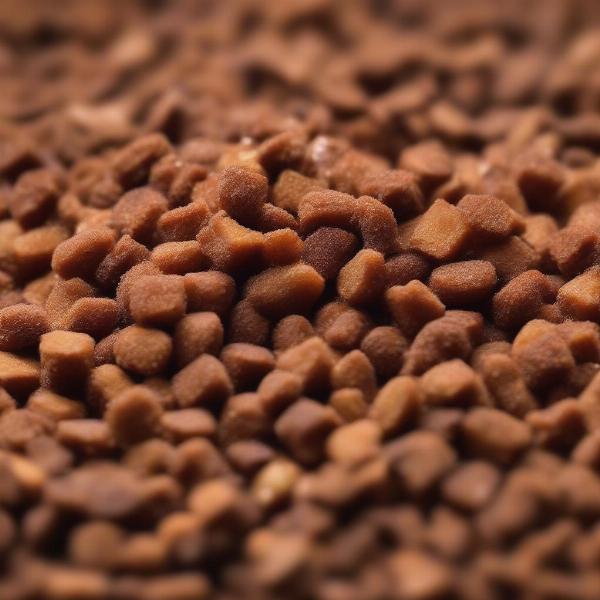Palm oil in dog food is a common ingredient, often used as a fat source and to improve palatability. But is it safe for our canine companions? This article will delve into the potential benefits and risks of palm oil for dogs, helping you make informed decisions about your furry friend’s diet.
Understanding Palm Oil in Dog Food
Palm oil is a vegetable oil derived from the fruit of the oil palm tree. It’s a versatile ingredient found in various human and pet food products. In dog food, it’s primarily used to enhance texture, add flavor, and provide a concentrated source of calories. Manufacturers may also use it as a stabilizer to preserve the food’s quality and prevent spoilage.
 Palm oil in dog food – a close up
Palm oil in dog food – a close up
While palm oil can provide a source of fatty acids, it’s important to consider the potential drawbacks. One major concern is the sustainability of palm oil production. Deforestation and habitat loss are significant environmental issues associated with palm oil harvesting. Therefore, choosing dog food containing sustainably sourced palm oil is crucial.
The Potential Benefits and Risks of Palm Oil
Palm oil contains saturated and unsaturated fats. While saturated fats can contribute to weight gain and heart problems in excess, they also provide a quick energy source. Unsaturated fats, including omega-6 fatty acids, are essential for skin and coat health. However, too much omega-6 can lead to inflammation.
The primary concern with palm oil for dogs is its high saturated fat content. This can contribute to obesity, pancreatitis, and other health issues. Additionally, some dogs may have allergies or sensitivities to palm oil, leading to digestive upset or skin problems.
Choosing Dog Food with Palm Oil
When selecting dog food containing palm oil, opt for brands that use sustainably sourced palm oil. Look for certifications like RSPO (Roundtable on Sustainable Palm Oil), which indicate responsible production practices. It’s also essential to consider the overall nutritional profile of the dog food. A balanced diet with appropriate levels of protein, carbohydrates, and fats is crucial for your dog’s well-being.
If you’re concerned about the potential risks of palm oil, consider dog food formulated with alternative fat sources, such as fish oil or chicken fat. Always consult your veterinarian if you have any questions or concerns about your dog’s diet. They can provide tailored recommendations based on your dog’s individual needs and health status.
Conclusion
Palm oil in dog food can be a source of essential fatty acids, but its high saturated fat content and sustainability concerns warrant careful consideration. Choose dog foods with sustainably sourced palm oil and consult your veterinarian to ensure it’s the right choice for your furry friend.
FAQ
- Is palm oil toxic to dogs? Palm oil itself isn’t toxic, but the high saturated fat content can pose health risks if consumed in excess.
- What are the signs of palm oil allergy in dogs? Allergic reactions can manifest as digestive upset (vomiting, diarrhea), skin issues (itching, redness), or ear infections.
- Are there healthier alternatives to palm oil in dog food? Yes, options like fish oil and chicken fat provide essential fatty acids with fewer saturated fats.
- How can I tell if palm oil is sustainably sourced? Look for certifications like RSPO on the dog food label.
- Should I avoid all dog food containing palm oil? Not necessarily, but consult your vet and prioritize sustainably sourced options.
- Can palm oil cause pancreatitis in dogs? High fat diets, including those with palm oil, can contribute to pancreatitis, especially in predisposed breeds.
- What should I do if I suspect my dog has a palm oil allergy? Consult your veterinarian immediately for diagnosis and treatment.
About ILM Dog
ILM Dog is your trusted international resource for all things dog-related. We offer expert advice on breed selection, health and medical care, training, nutrition, grooming, exercise, puppy care, senior dog care, traveling with your dog, and product recommendations. We believe in providing practical and reliable information to dog owners worldwide, empowering them to make the best decisions for their beloved companions. Contact us for expert advice: Email: [email protected], Phone: +44 20-3965-8624. Let ILM Dog be your guide to a happier, healthier life for your canine companion!